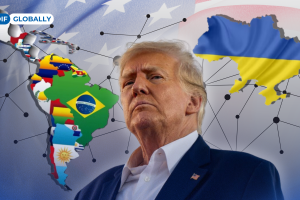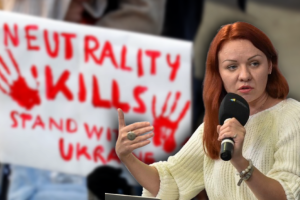Escalation vs. Détente: What Should Ukraine Expect?
Maria Zolkina for Novoe Vremia
Ukraine's Western allies keep discussing Russia's invasion. Meanwhile, the Kremlin is resorting to new maneuvers: from plans to allegedly withdraw some troops from the Ukrainian border to steps toward recognizing the independence of the so-called "republics" in the occupied territories of Donbas. However, it is clear that no one believes in de-escalation when it is only spoken about. So, what game has Russia been playing in recent days and what should Ukraine prepare for?
Descalation? No, we have not heard about it
The claim of the Russian Ministry of Defense about the alleged return of Russian troops from the exercises on the Ukrainian borders to their places of permanent deployment should not reassure anyone in any way.
Moreover, the probability of a further aggression against Ukraine may turn out to be even greater. This is especially true of the likelihood of a hybrid attack. It will include a significant, but still local military escalation. In particular, an offensive operation from the occupied Donbass towards the Ukrainian-controlled territories. It could be accompanied by a whole set of hybrid aggressive actions. Unprecedented cyber attacks have already taken place. Attacks on critical infrastructure, military bases where equipment, vehicles and ammunition are stored, subversive and terrorist attacks will all simultaneously reduce Ukraine's resilience and stability from within, outside the theater of open combat operations.
Although President Biden stated this week for the first time so directly that any kind of aggression (not only a full-scale invasion) would receive a harsh U.S. response, there is one option of military escalation that leaves Russia a way to "excuse" its interference in the conflict. And that option is escalation from the position of occupied Donbass.
Since Russia denies the presence of its regular troops in the occupied part of the Donbass, it would be very suitable to renew active combat operations by the forces of the so-called "republics." Russia could then openly join the combat actions under one of two pretexts.
The first one is Putin's decree recognizing the independence of the so called "DPR/LPR" and then providing them with military assistance upon their request.
Another possible pretext is the protection of Russian citizens. The mass issuance of Russian passports to local residents of occupied Donbass, as well as Russian legislation on the protection of "compatriots" anywhere in the world create formal grounds for this.
Thus, Russia's statements about withdrawal of troops may be nothing more than a maneuver, an attempt to show "goodwill" for détente. At least for those who want to see this goodwill in the Kremlin's actions, like Germany, for example. And simultaneously to start hybrid aggression by proxies' hands or by covert, subversive methods.
Moreover, the possibility of Putin recognizing the independence of the so-called republics only increases tensions on the diplomatic front.
What will happen to the negotiations?
Despite the active shuttle diplomacy there is no détente. The negotiations between Ukraine and Russia in the Normandy format have reached a dead end. Now Russia has only raised the stakes by possible recognition of the independence of the so-called "DPR/LPR". However, Russia immediately received a harsh and consolidated reaction from Western countries and organizations: this step will be understood as Russia's exit from the Minsk agreements and as Russia's recognition of the violation of Ukraine's territorial integrity.
To recognize or not to recognize the independence of the so-called "DPR/LPR" - this card can be played differently by Russia over the next few days or two weeks at most.
On the one hand, Putin is in no position not to recognize their independence. Otherwise he would look like a weak figure who did not carry the matter through to the end. However, the consequences of non-recognizing the independence of so called "DPR/LPR" will still be internal: for the internal Russian audience and the audience in the occupied Donbass. For Putin, this matters less than the reaction of Western leaders.
On the other hand, if he recognizes these pseudo-republics, he provides himself with at least some justification for participating in the new hybrid aggression against Ukraine, as discussed above. However, this ruins the Minsk agreements in one fell swoop. In that case, Ukraine would not have to explain anything to anyone, because it was Russia that exited the Minsk agreements. This is probably the only but significant benefit for Kyiv.
It is plausible that this is why Russia will try to push Ukraine for the compromises that the Kremlin needs. Pending Putin's official decision. For this purpose, Moscow will resort to organizing an urgent meeting of advisers in the Normandy format, where with renewed vigor it will demand from Ukraine a direct dialogue with the "DPR/LPR" and "special status" for occupied Donbas.
At the same time, Russia will put pressure on European leaders with suggestions to agree that Ukraine would not join NATO. Discussing this issue with the U.S. makes no sense now, but it may be fruitful for Russia to discuss the issue with Berlin. Russia will also be satisfied if there is no consensus among Western allies on the limits of an acceptable compromise for common détente.
If it fails, Russia might return to the scenario with a large-scale hybrid attack. Including the recognition of the so-called republics, but a little later.
Thus, in the coming days Ukraine under no circumstances should follow the logic imposed on us by Russia. And the prospect of recognizing the independence of the so-called "DPR/LPR" should neither frighten Kyiv nor encourage it to make any concessions. The likelihood of escalation in such a case does indeed increase, but perhaps this is exactly the moment when Ukraine gets a chance to restart the negotiation process on more favorable terms than Minsk, without any diplomatic losses.









